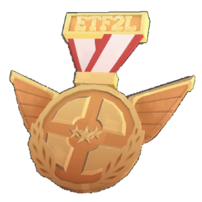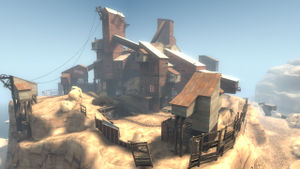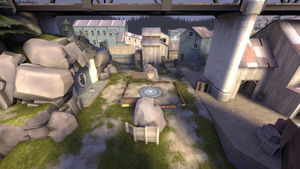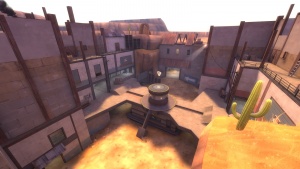Difference between revisions of "Highlander"
m (added examples of highlander cp maps) |
m (→Stopwatch) |
||
| (86 intermediate revisions by 36 users not shown) | |||
| Line 1: | Line 1: | ||
| − | + | [[File:ETF2L first place medal.png|thumb|200px]right|[[ETF2L]] medal awarded to players finishing in the first place]] | |
| − | |||
| − | |||
| − | + | '''Highlander''', a form of '''9v9''', is the largest competitive Team Fortress format. Its similarities to average public servers make it an ideal starting point for new players, and its requirement that each team has one of every class ensures a spot on the team for players maining any given class. | |
| − | == | + | == Highlander Competitive Format == |
| − | + | Highlander is a competitive format with nine players on a team, each representing a different class. The name of the format comes from the quote "There can only be one [of each class]" from [http://en.wikipedia.org/wiki/Highlander_(film) Highlander], a movie released in 1986. | |
| − | ===Stopwatch=== | + | == Game Modes == |
| + | === Stopwatch === | ||
| + | ''Main Article: [[Payload]], [[Attack/Defend]]'' | ||
| + | [[File:Upward.jpg|thumb|Upward, the most iconic Highlander map]] | ||
| + | [[Payload]] and [[Attack/Defend]] maps are played using a stopwatch format, where teams alternate between attacking and defending after each round. The team that captures more points on offence wins. Should both teams capture the same number of points, the team that does so in a shorter duration wins. | ||
| − | + | Payload maps played in Highlander include [[Upward]], [[Swiftwater]], and [[Vigil]]. <br/> | |
| + | Attack/Defend maps played in Highlander include [[Steel]]. | ||
| − | == | + | === [[King_of_the_Hill|King of the Hill]] === |
| + | ''Main Article: [[King_of_the_Hill|KOTH]]'' | ||
| + | [[File:Product.jpg|thumb|Product, the most commonly played KOTH map in Highlander]] | ||
| + | In a King of The Hill map, there is one central point on the map. Each team must try to capture that point. When one team does capture the point, their 3:00 timer will begin to time down. When the other team captures the point, the other team's timer stops and their timer starts to tick down. The first team whose clock reaches 0 wins the round. It is important to note that if the point has capture progress on it when one team's timer reaches 0, the game will go into [[overtime]], where the defending team must wait for the capture progress to reverse fully or the attacking team must capture the point to continue ticking down their own timer. | ||
| − | + | KOTH maps played in Highlander include [[Product]], [[Ashville]], and [[Warmtic]]. | |
| − | [ | + | === 5CP === |
| + | ''Main Article: [[5CP]]'' | ||
| + | [[File:Gullywash.jpg|thumb|Gullywash, the most commonly played 5CP map in Highlander]] | ||
| + | 5CP maps involve both teams trying to capture all 5 control points to win a round. Capping the midpoint results in the winning team getting a forward spawn that allows the rest of the team to attack the next point quicker, and likewise for the fourth point. In Highlander, 5CP maps usually receive negative feedback due to stalemate situations that can last for an extensive amount of time. For example, on [[Gullywash]], when either team is unable to gain any significant advantage when trying to push forth, a typical three-four stalemate is seen where both teams play behind choke, waiting for the other to make a move. | ||
| − | [ | + | 5CP maps played in Highlander include [[Gullywash]] and [[Vanguard]]. |
| − | [ | + | == Highlander Leagues == |
| + | [[File:RGL HL first place medal.png|thumb|10px]right|[[RGL]] medal awarded to players finishing in first place]] | ||
| + | [[File:UGC first place medal.png|thumb|10px]right|[[UGC]] medal awarded to players finishing in first place]] | ||
| − | + | === Multinational === | |
| − | ( | + | * [[UGC]] ([http://www.ugcleague.com Website]) |
| − | + | === North American === | |
| − | ( | + | * [[RGL]] ([http://hl.rgl.gg Website]) |
| − | + | === European === | |
| − | [http://www. | + | * [[ETF2L]] ([http://www.etf2l.org Website]) |
| − | == | + | === Asian === |
| − | ==See Also== | + | * [[Asia Team Fortress 2 League|ATF2L]] ([https://discord.gg/sA68jQuXzK Discord]) |
| − | *[[6v6]] | + | |
| + | |||
| + | == Highlander Coverage == | ||
| + | |||
| + | * [https://www.youtube.com/KritzKast Kritzkast] | ||
| + | |||
| + | * [https://www.youtube.com/@RGLgg RGL] | ||
| + | |||
| + | |||
| + | == Guides == | ||
| + | Over time the community has written a handful of guides on how to play this popular format, some of them can be seen below: | ||
| + | * [http://steamcommunity.com/sharedfiles/filedetails/?id=163882605 Introduction to European Highlander] | ||
| + | * [https://steamcommunity.com/sharedfiles/filedetails/?id=2715815879 Guide to Highlander by Blitztank] | ||
| + | |||
| + | == See Also == | ||
| + | * [[6v6]] | ||
| + | * [[Prolander]] | ||
| + | * [[4v4]] | ||
| + | * [[Competitive_Formats|Competitive Formats]] | ||
| + | [[Category:Competitive Formats]] | ||
Latest revision as of 03:04, 8 December 2022

Highlander, a form of 9v9, is the largest competitive Team Fortress format. Its similarities to average public servers make it an ideal starting point for new players, and its requirement that each team has one of every class ensures a spot on the team for players maining any given class.
Contents
Highlander Competitive Format[edit]
Highlander is a competitive format with nine players on a team, each representing a different class. The name of the format comes from the quote "There can only be one [of each class]" from Highlander, a movie released in 1986.
Game Modes[edit]
Stopwatch[edit]
Main Article: Payload, Attack/Defend
Payload and Attack/Defend maps are played using a stopwatch format, where teams alternate between attacking and defending after each round. The team that captures more points on offence wins. Should both teams capture the same number of points, the team that does so in a shorter duration wins.
Payload maps played in Highlander include Upward, Swiftwater, and Vigil.
Attack/Defend maps played in Highlander include Steel.
King of the Hill[edit]
Main Article: KOTH
In a King of The Hill map, there is one central point on the map. Each team must try to capture that point. When one team does capture the point, their 3:00 timer will begin to time down. When the other team captures the point, the other team's timer stops and their timer starts to tick down. The first team whose clock reaches 0 wins the round. It is important to note that if the point has capture progress on it when one team's timer reaches 0, the game will go into overtime, where the defending team must wait for the capture progress to reverse fully or the attacking team must capture the point to continue ticking down their own timer.
KOTH maps played in Highlander include Product, Ashville, and Warmtic.
5CP[edit]
Main Article: 5CP
5CP maps involve both teams trying to capture all 5 control points to win a round. Capping the midpoint results in the winning team getting a forward spawn that allows the rest of the team to attack the next point quicker, and likewise for the fourth point. In Highlander, 5CP maps usually receive negative feedback due to stalemate situations that can last for an extensive amount of time. For example, on Gullywash, when either team is unable to gain any significant advantage when trying to push forth, a typical three-four stalemate is seen where both teams play behind choke, waiting for the other to make a move.
5CP maps played in Highlander include Gullywash and Vanguard.
Highlander Leagues[edit]


Multinational[edit]
North American[edit]
European[edit]
Asian[edit]
Highlander Coverage[edit]
Guides[edit]
Over time the community has written a handful of guides on how to play this popular format, some of them can be seen below:


